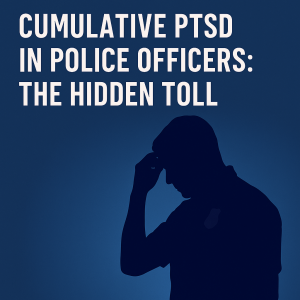Cumulative PTSD in Police Officers: The Hidden Toll
 Cumulative PTSD in Police Officers: The Hidden Toll
Cumulative PTSD in Police Officers: The Hidden Toll
By Dr. Michelle Beshears
PTSD isn’t just a military issue—police officers face it too. Unlike soldiers, whose PTSD often comes from a single traumatic event, officers develop cumulative PTSD over years of repeated stress. This quiet buildup can affect their mental health, family life, and even public safety if left unaddressed.
What is Cumulative PTSD?
Cumulative PTSD develops gradually from multiple stressful experiences. While major incidents like officer-involved shootings often trigger support, day-to-day stressors usually go unrecognized, leaving officers vulnerable to untreated trauma.
Common Causes of PTSD in Policing
High-stress and dangerous situations contribute, but even routine work can accumulate stress:
-
Fatal accidents and violent incidents
-
Hostage or dangerous drug raids
-
Long, unpredictable hours
-
Difficult interactions with the public
-
Department politics or internal conflict
-
Public criticism and scrutiny
Even “smaller” stressors, repeated over time, can have serious effects.
Signs to Watch For
Early recognition is crucial. Signs appear across physical, behavioral, and emotional domains:
Physical: fatigue, nausea, chest pain, insomnia, nightmares, rapid heartbeat, headaches, teeth grinding, gastrointestinal issues.
Behavioral: withdrawal from family/friends, restlessness, emotional outbursts, paranoia, antisocial behaviors, increased substance use.
Emotional: anxiety, depression, irritability, anger, guilt, fear, denial, agitation.
Why Training Isn’t Enough
Recruits often receive situational and tactical training but are underprepared for the emotional toll of real-world policing. Many lack the coping tools needed to manage cumulative stress over time.
Support and Resources
Awareness of officer trauma is growing. Programs like the Station House Retreat offer:
-
Inpatient and outpatient trauma therapy
-
Peer-support networks
-
Addiction treatment
-
Family support services
These resources are essential to help officers manage the unique pressures of their profession.
Moving Forward
Cumulative PTSD is a hidden but serious challenge in law enforcement. Addressing it requires:
-
Early recognition and intervention
-
Accessible mental health resources
-
Departmental support for long-term officer wellbeing
By acknowledging and treating cumulative PTSD, law enforcement can protect both officers and the communities they serve, building a healthier, more resilient workforce.
About the Author
Dr. Michelle L. Beshears holds degrees in social psychology, criminal justice, human resource development, and criminology, and earned her Ph.D. in Business Administration with a focus on Criminal Justice. She served 11 years in the U.S. Army, rising to the rank of Staff Sergeant before being commissioned as an officer. Dr. Beshears has led criminal investigations and collaborated with local, state, and federal agencies. She is an associate professor of criminal justice at American Military University and a full-time faculty member in the School of Security and Global Studies.

